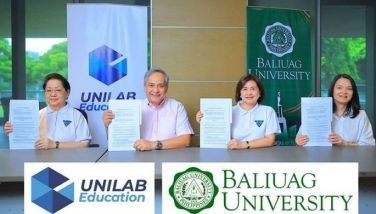Geopolitical weakness
Two recent events highlight the weak spots of the Philippines as a sovereign nation in the global community. The first event is the resumption last week of the International Criminal Court’s investigation of the thousands of drug war-related killings during former president Rodrigo Duterte’s watch as president and as Davao City mayor.
The other one is the announcement on Thursday by both the US and Philippine governments of the expansion of US military access to Philippine military bases under the Enhanced Defense Cooperation Agreement (EDCA).
Both developments earned mixed reactions from different sectors. The ICC investigation was described by Duterte and his allies as an insult to the Philippines. But for human rights groups and critics of Duterte’s violent war on drugs, the ICC investigation is an insult well-deserved.
For those not familiar with the nature of the ICC and how it works, my good friend Atty. Kristina Conti who is in the ICC list of assistants to counsel summed it up well in her social media post. She said that participation in the ICC or inclusion in its investigation could not be reduced to a simple issue of sovereignty. “Hindi porke’t international court ito ay may naghihimasok na agad (The fact that it’s an international court does not necessarily mean it’s an intervention in a nation’s internal affairs),” Conti said.
The ICC is there against people or groups who sow horror and commit crimes against humanity but manage to evade accountability and justice, particularly because they are in positions of power, Conti said. The ICC is limited in investigation to crimes against humanity. And it only comes in when national mechanisms are unwilling or unable to investigate or prosecute the perpetrators of those crimes.
Apparently, the ICC Pre-Trial Chamber has determined that the Philippine government is not “making a real or genuine effort to carry out investigations and any subsequent criminal prosecutions” on the drug war-related killings. While chief presidential legal counsel Juan Ponce Enrile is correct in saying that the ICC has no sovereign powers over the Philippines and should ask permission first from the government before sending people here to investigate, the Philippines risks international loss of trust and good standing if it appears to cover up the truth on the drug war killings.
As I said earlier, it’s an international insult served up with a good dose of “you deserve it!” We tolerated and even celebrated a violent drug war that killed thousands of suspected street-level drug peddlers but that failed to curtail drug smuggling, yet managed to corrupt the ranks of the Philippine National Police.
Another insult, but this time not deserved, is our being made a pawn in the simmering geopolitical crisis between the United States and China over the issue on Taiwan and control of the South China Sea. It’s not surprising that we are closer to the US than China because of our historic ties with our former colonial ruler. It’s likewise no secret that the Philippine military is trained and heavily influenced by the US and its equipment largely US-supplied. I also have yet to hear a Filipino who if given a choice of where to migrate between China and the US, would choose China.
Like Japan, Taiwan and other nations in East and Southeast Asia, we need the US as our strategic partner against a big, insecure, anti-democratic bully that is China. And no doubt this partnership is what our people want at this time.
But there’s a big difference between a partner and a pawn. A partner relies on its own strength but also uses its allies to enhance each other’s powers. A pawn consciously or insentiently persists in maintaining a weak geopolitical posture because it prefers to rely on a superpower it naively thinks is its big brother. The “big brother” thus humors and patronizes the pawn for as long as the latter is useful to its own interests.
Historically, we’ve been stuck in a weak geopolitical position for over a century because of our weak political system and easily corruptible institutions. We don’t have real political parties that every principled statesman can lean on when things get tough.
While we don’t take palpable insults from foreigners kindly, we can only complain so much because we’re too weak to be consequential. But in the face of implied but more potent insults from our own Filipino politicians in every election and in every favor made under the table, we just turn the other cheek.
- Latest

























